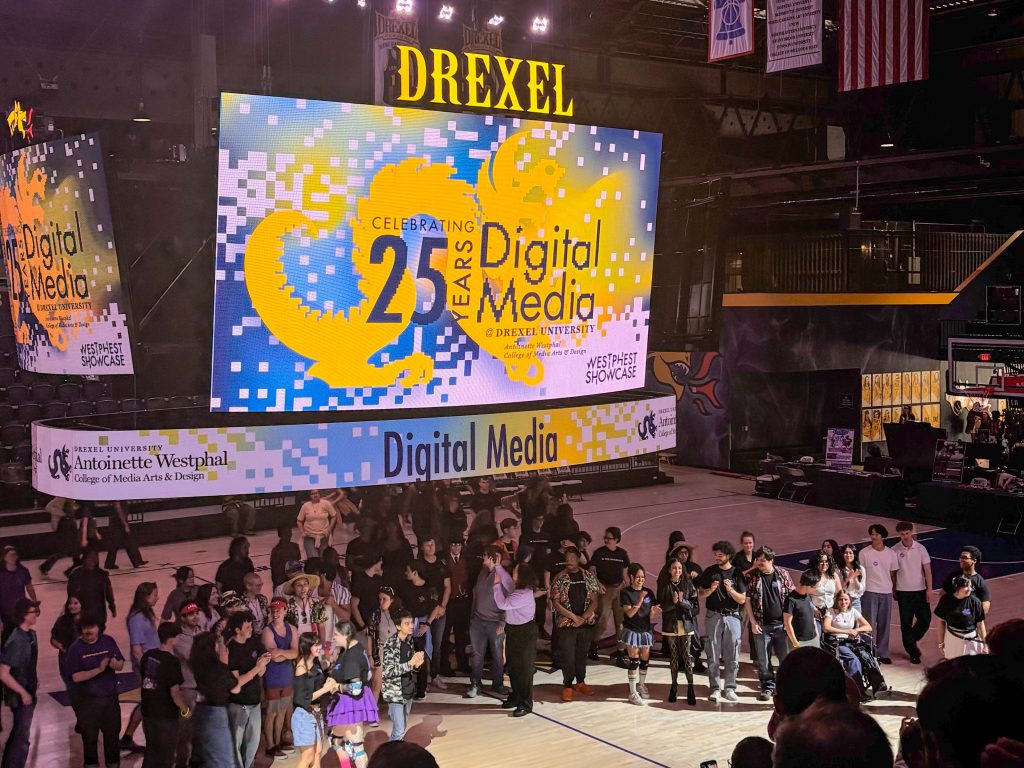
The 25th annual Digital Media Showcase was held at the Drexel Recreation Center on May 31. The digital media seniors used the showcase as an opportunity to present their capstone projects, which they have been working on for the past year. This year’s showcase was indicative of the richness of the program as well as its ongoing development.
The program featured a wide range of projects, from multiplayer games and interactive stories to mobile apps, digital instruments and short films. Projects varied from those developed merely for fun to those aimed at practical application. Throughout, the work emphasized collaboration, experimentation and a solid grasp of the relationship between storytelling and technology.
Several groups used game design methods to develop interactive, fast-moving experiences. The game “Boast Guards” by Starworks Studios was a multiplayer title based on party games like “Overcooked.” Users play as lifeguards who manage a crowded beach, juggling duties to keep the beach tidy and improve its reputation. Sleep Deprived Studios showcased “Falling into Frame,” a narrative game in which a couple is transported into a magical forest through a painting. The game follows their efforts to return home while confronting the question of whether or not they still belong together.
Narrative and world-building were central to other projects. “Spiral Peak” from Cryptid Studios chronicled the dissolution of a relationship in an offbeat Appalachian world. A moody and atmospheric experience, the game employed close narration with super cool visuals. “Charming Folks,” meanwhile, crafted a peaceful and exploratory environment. Set in a mystical town, the game encouraged players to interact with residents and uncover hidden information about the world itself.
Others extended well beyond traditional gameplay. They prioritized usefulness and daily functionality. “Bench Quest” redesigned fitness tracking as a role-playing experience, rewarding players within the game for submitting actual workouts in the real world. “Mend” rethought physical therapy with directed exercises, personalized milestones and tracking of progress. “Juncture” was created as an event planning solution to help users manage group schedules and post pictures and messages from shared events. “Tandem” was utilized as a couples’ relationship tool, offering the couple a common timeline to plan activities and mark milestones.
A variety of projects addressed problems with immediate, practical applications. “Subletta” aimed to simplify students’ ability to sublet. With verified profiles and in-app help options, the app offered a better way for students to rent and sublet apartments that was more efficient and secure. “Subletta” was an example of a game that could be a practical tool, and one that can definitely be used by the Drexel community.
A number of groups were focused on aesthetics and creative design. “Medusa and the Pilot” reimagined the tale of Medusa in hybrid form with 2D animated characters and 3D worlds, something that has not been seen within Drexel’s digital media program before. The story followed the affair between Medusa and a blind pilot who had crash-landed, with the two becoming connected over time. “Reverie,” a live-action virtual reality piece, led a young woman through her grandmother’s scrapbook. Each page took her to a new world, ranging from snow-covered landscapes to erupting volcanoes. It dissolves the lines between memory, imagination and lived experience.
Action-packed media was also featured. “VeloCity” imagined a futuristic city in which skaters battle, each character having their own unique trick and look. With its colorful graphics and smooth flow, it definitely got some attention. “Impatient,” a lively music video created for a song by Cheap 52, a band composed of Drexel alumni, used color and image to build the narrative. The video was about two musicians pursuing their dreams to play. “The Sweetest Prize,” an animated short, was about a colony of ants fighting off a predator. The short was brief and visually strong, conveying a complete story with funny narration from the narrator. Among the more ambitious was “Tyranny of Substance,” a turn-based strategy game situated in a flintlock fantasy world characterized by political tumult. The game traces the course of a revolutionary movement and has players contending with the consequences of their decisions. Slower in tempo and more complex, the project stood out for its thematic depth.
The show this year encompassed a wide range of interests, resources and approaches. The students used the opportunity to demonstrate technical skill, innovative thinking and problem-solving. From practical applications to genre-traversing narrative games, the projects showed how the program fosters personal expression and collective design.
The Digital Media Showcase is an essential part of the digital media curriculum. It is growing in size and scope, reflecting not only the skills of the students but the technologies and the challenges that will prevail in the future of media design. From this year’s work, it is clear that Drexel’s digital media students are establishing the skills to be successful in both creative and technical fields.


